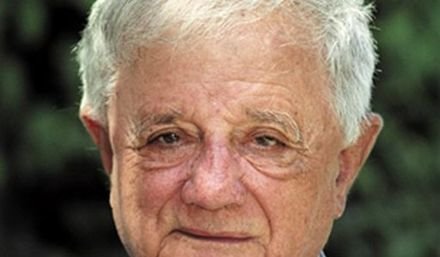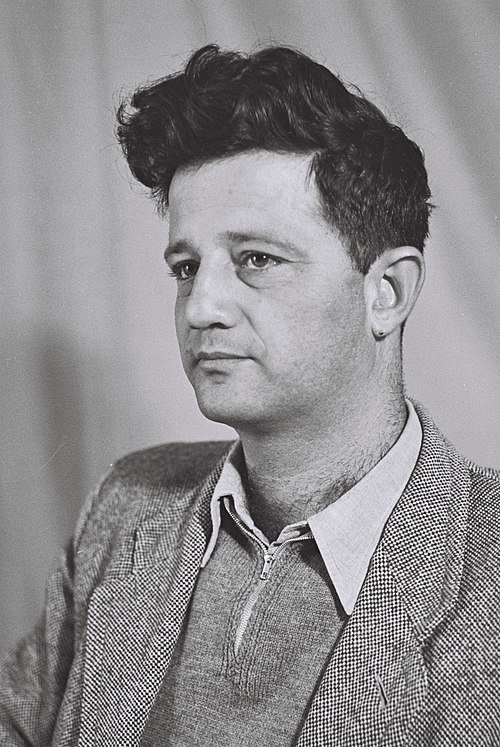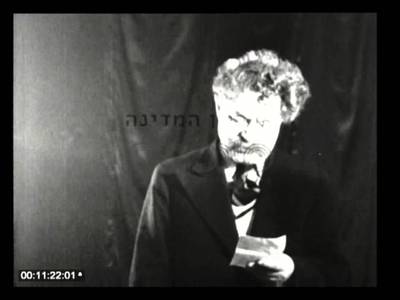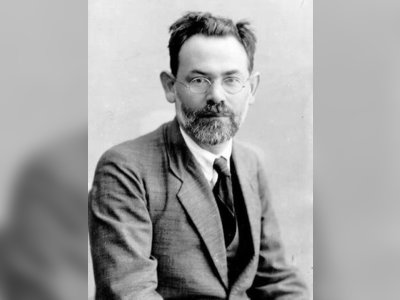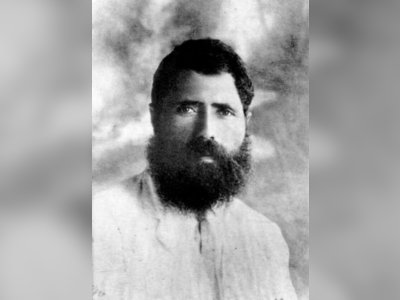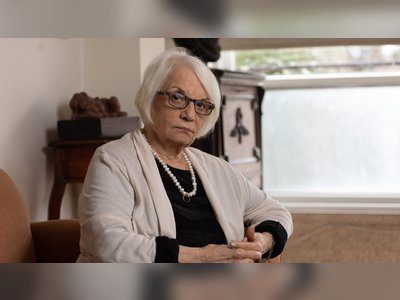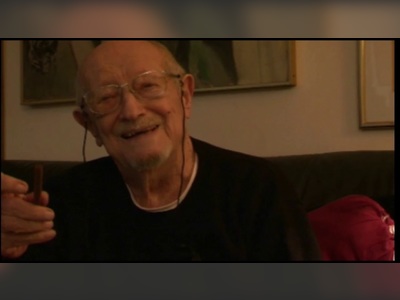S. Yizhar
Also known as Yizhar Smilansky, was a prominent Hebrew writer, educator, and member of the Knesset (the Israeli parliament). He was a recipient of the Israel Prize for Literature and the A.M.T. Prize for Literature.
The pen name S. Yizhar was given to him by the poet and editor Yitzhak Lamdan when he published his first story, "Ephraim Returns to Asifat," in the journal "Gilyonot" in 1938. From then on, Yizhar signed his fictional works as S. Yizhar and his essays as Yizhar Smilansky. He is often associated with the writers of the "Statehood Generation," although he himself resisted such categorization.
Biography
Yizhar was born to Ze'ev and Miriam Smilansky on the experimental farm in Hulda on September 27, 1916, where his parents resided for several years. Yizhar was born into a family of writers: his father, Ze'ev Smilansky (known as Z.S.), was one of the leaders of the "Young Worker" movement, and his uncle was the famous writer Moshe Smilansky. Other notable writers in the Smilansky family included Meir-Sikko and David. Ze'ev and Miriam met Yehudit Hareari on the streets and named their second son Yizhar following the name she bestowed upon their firstborn.
After the war, the family moved to Tel Aviv, where Yizhar began his elementary studies at the "Balfour" elementary school. When he was around 11, his parents moved to Rehovot, and Yizhar completed his elementary studies at the local elementary school.
His older brother, Yisrael, was killed in a car accident while traveling to the Negev on behalf of the Keren Hayesod Foundation in 1941.
At the age of 16, Yizhar met Naomi Weilman, whom he married in 1942. In the same year, their son Israel was born, followed by the birth of their daughter Hila in 1944 and their son Ze'ev in 1954.
Yizhar completed his teaching studies at the David Yellin Teachers College in Beit HaKerem, Jerusalem, and worked as a teacher in Yavne'el, Kfar Hayarok, and Rehovot. In 1937, he began his university studies in natural sciences but did not complete them. During the War of Independence, he served as an intelligence officer in the Southern District "Machoz HaShfela."
Yizhar began his academic studies at the age of 52, this time in the field of education, focusing on "How to Teach Reading Stories." He continued his studies at the university, eventually obtaining his third degree. He served as a professor of education at Tel Aviv University and as a lecturer at Levinsky College for Education until his retirement.
Yizhar was a member of the Knesset representing the Mapai party from the first Knesset in 1949 until 1967, except for a one-year break at the beginning of the third Knesset, during which he declared his beliefs in March 1957. He served on the Education, Culture, and Sports Committee, the Foreign Affairs and Defense Committee, and the Constitution, Law, and Justice Committee.
During his time in the Knesset, Yizhar focused on education and culture-related matters. He played a significant role in promoting the concept of "Knowledge of the State," which aimed to transform Israel into a high-tech nation. However, his efforts were often met with indifference by the Mapai party leadership.
Despite being a member of the ruling party, Yizhar did not hesitate to criticize the government's handling of education, dedicating a substantial portion of one of his speeches to criticizing state institutions that failed to sufficiently support the younger generation, leading them towards a life of "espresso generation" – a generation seeking quick, sharp, and cheap experiences and rejecting idealism.
In July 1964, he proposed the legislation for the Protection of Nature and Open Spaces Act, which was passed at the end of 1964.
For much of the "silent literature years" of Yizhar, which followed the publication of his major work, "Days of Tziklag," he did not publish literary works but was highly active in journalistic writings, mainly during and after the First Lebanon War.
In Professor Nitza Ben-Ari's biography, "Life Story," details are provided about romantic relationships Yizhar had while married to Naomi Smilansky. According to the book, Naomi chose to continue living her life despite being aware of Yizhar's affairs.
Among the awards he received are the Ramat Gan Municipality Prize in 1943 for his early stories, the Ruppin Prize in 1948 for "The Grove at Giv'at Harel," and the Brenner Prize in 1950 for "Midnight Convoy."
In 1959, Yizhar received the Israel Prize at the age of 43, making him one of the youngest recipients of the prestigious award. In addition to his literary work, he wrote prolifically in journalism, particularly during and after the First Lebanon War.
In 1994, he was awarded an honorary doctorate by the University of Haifa. He also received an honorary doctorate from the Weizmann Institute of Science and Ben-Gurion University in the Negev.
He passed away in 2006 and was buried in the cemetery of the Gederot Regional Council.
His Approach to Values
Yizhar Smilansky's central belief was that education for values is impossible, both because values naturally change with the times and because the evolving reality presents new dilemmas. Moreover, it's impossible to impose a specific set of values on an individual against their free will. He argued that values should not be imposed but chosen autonomously.
In three cases, values have a place in education. First, negatively, when one suppresses the educational process and forces it to be accepted without resistance, which no longer qualifies as education. Second, when values are indirectly offered, almost in silence, and third, when consent is required, and the individual chooses to accept the values. Yizhar concluded that "one does not need to educate for values, and it is impossible."
Regarding the teaching of literature, Yizhar advocated for liberating literature from the educational system, from theoretical research, from various theories, and literary mappings.
He called for a person-to-person encounter, liberating literature from sociology, psychology, ideology, and generality. Yizhar believed in the liberation of literature from the general and from the period, and from the generation. He suggested freeing literature from scholars who are well-versed in literature and from learned experts, and from their cold hands.
And what then? Simply take a book and read it for enjoyment. That's it. Read "simply," without interpretation and without Freud and without Levi-Strauss, and without their disciples and disciples' disciples. Read "it" and not "about it" as much as possible, in the personal presence and personal openness, in personal invention, and with a detached personal perspective.
To read stories from them and beyond them, and to begin reading stories from them and inside them; to read not just the part that appears but also what is missing, to imagine the story and to identify with it, to enjoy "it" and not only what is "it," and perhaps even to encounter "I" from the other side of "I."
His Literary Style
Yizhar's writing style is known for its complexity, rich description, and deep exploration of the human psyche. He often used long, flowing sentences that captured the intricacies of human thought and emotion. His writing was deeply rooted in the Israeli landscape, and he frequently used nature and the environment as symbols to convey his characters' inner worlds.
One of his most famous works is "Khirbet Khizeh" (Hirbet Hizah), a novella published in 1949 that portrays the expulsion of Palestinian villagers during the 1948 Arab-Israeli War. The novella is known for its moral and ethical exploration of the conflict and is considered a classic of Israeli literature.
Yizhar's writing often delved into the complexities of Israeli society, identity, and the moral dilemmas faced by individuals in the midst of conflict. His works continue to be studied and appreciated for their literary and philosophical depth.
In addition to "Khirbet Khizeh," some of S. Yizhar's other notable works include:
1. "Days of Tziklag" (Yamim Ha'Chol) - This novel, published in 1958, is one of Yizhar's most significant works. It explores themes of memory, identity, and the impact of war on individuals and society.
2. "Preliminaries" (Tahagigim) - A collection of short stories that reflect Yizhar's literary style and exploration of human experiences.
3. "Facing the Forests" (Mulsamim Le'Ya'arot) - A collection of essays and reflections on various topics, including literature and culture.
S. Yizhar's works are an integral part of Israeli literature and continue to be read and studied by scholars, students, and readers interested in the complexities of Israeli society and the human condition.
- ס. יזהרhe.wikipedia.org
